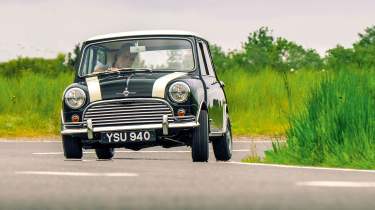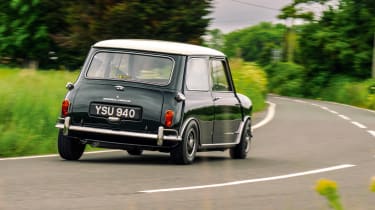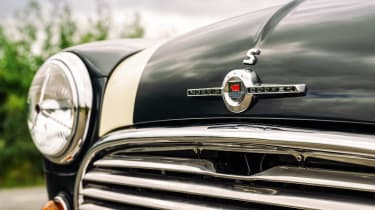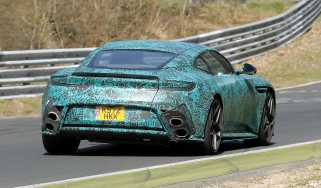Cooper Car Company 75 2023 review – £110,000 Mini Cooper S driven
The limited-edition Cooper S ‘75’ combines the best of old and new in the ultimate road and track day Mini package
It’s akin to Red Bull Racing taking a humble hatchback, instructing the genius of Adrian Newey to make suitable modifications, painting it satin dark blue with yellow and red graphics, then destroying the opposition in the BTCC and beyond. Not a marketing exercise but a road-going homologation special, designed in the same workshops at Milton Keynes that build Max’s cars, that becomes an unstoppable force on the track. As impossibly cute and cuddly as the little green Mini sitting expectantly in front of me is, I’m reminded that’s exactly what happened all those years ago, when the then F1 world champions really did take our national car maker’s people’s car and forge it into a formidable competition machine.
All of which must make this 1965 Mini Cooper S more authentic and evo-appropriate than almost any other, for it carries the Cooper family’s stamp of approval in its bloodline: this is the Cooper Car Company 75, designed and built to celebrate both the 75th anniversary of the Cooper Car Company and the 60th anniversary of the original Cooper S.
> Frontline LE60: V8-engined MGB restomod unveiled with 375bhp
The Coopers of the rallying world were red because they were run by the BMC factory competition department; the lesser-known cars that won the British Touring Car Championship and various overseas series throughout the ’60s were Connaught Green with Old English White stripes and roof because they were run by John Cooper’s Cooper Car Company, F1 champions in 1959 and 1960, and those were the team’s racing colours. The 75 is a homage to those works cars, and also John’s son Mike Cooper’s idea of what an ultimate fast-road Mk1 Cooper S should be, useable on both road and trackdays.
More reviews
Just 20 examples of the 75 will be built, and both the original concept and the cars themselves emanate from a new firm based near Southend-on-Sea called the Brightwell Motor Company. In a large, very clean workshop, bustling with an eclectic mix of classic and modern-classic cars, is a small team with decades of experience at some high-profile companies. Amongst them is Scott Turner, one of the UK’s pre-eminent original Mini experts and a frequent concours winner. As with any conversation with someone highly passionate and incredibly well-informed on a specific subject matter, a chat with Scott about old Minis is a constant stream of information, intricate detail, parts numbers and colour charts that expands one’s knowledge by multiple factors in mere minutes. I’m not surprised when he admits to having owned over 300 Minis in his lifetime.
The idea for the 75 began when Mike Cooper asked Scott to build him a concours-standard Mk1 Cooper S to fill a gap in his collection. Conversations were had about Mike’s Cooper Car Company building a limited series of cars, but everything was put on ice when the pandemic began, while in the meantime Scott built up the prototype you see here. Fast forward to last year, and when Mike saw the car he gave the green light to proceed with the project.
The 75 isn’t a true restomod, nor strictly a new build; it incorporates a few concessions to modernity but is largely a concoction of ultimate must-haves within a period-correct framework. Brightwell could start with a new Heritage shell, but it’s not the correct Mk1 type, so instead each of the 20 cars will be based on an original S that’s stripped down to a bare monocoque. These then take on average 300 hours to restore to completely correct, original condition, even when some of the donor cars bought for the project have looked more than reasonable when acquired; decades of bodged repairs and modifications are only revealed once the cars are back to bare metal.
From there, the cars start to take shape, each one to be built by Scott over the course of six months. The spec will be nectar to Mini aficionados (I have greatly condensed the following) with the engine starting life as a 1275 GT block before being bored out to 1380cc and fitted with cast pistons, a Swiftune camshaft and twin HS4 SU carbs. Naturally, everything is balanced, and there’s a close-ratio helical gearset to make best use of the claimed 95-100bhp. That modernity? LED bulbs in the headlamps, some CNC-machined parts under the bonnet, electronic ignition, a hidden USB connector for your phone…
Beyond the restoration and technical spec, 75s can be recognised by their detailing: the spark-eroded ‘Cooper Car Co’ script on the rim of the wheels, the unique fuel filler cap, the tiny Cooper badge mounted inside the headlights, the unique ‘CCC’ pedal set, the steering wheel badge and column dropper that changes the angle of the wheel (more on that in a bit) and so on. The tiny gearlever knob is actually a Jaguar E-type part with a lead weight inside for a more balanced throw, but machined out to carry the Cooper badge. Everywhere you look there are wonderful details to drink in, and these will be strictly kept for the run of 20 cars, all of which will be to the same colour and trim scheme, inside and out.
Enough of the spec though; I’m desperate to drive it. I know the cliché is ‘Tardis-like’ when discussing the interior of a Mini, but it’s been a while, and as I fold my six-foot-plus frame into the 75, it’s as if I’ve inadvertently selected the wide-angle lens on my phone’s camera. How can the dashboard be so far away? How can there be so much space? The answer in part will come once we’re on the move, with the realisation that my squidgy bits are the crumple zone in the event of an impact, but for now such thoughts have been sidelined by the sheer rort of the A‑series engine warming up. It needs a little tickle with the throttle to stay idling when cold, but you have to giggle at the immediacy of the response. Slice the lever into first, up with the fairly weighty clutch pedal and the Mini literally springs forward, like a cat released from a travel cage. And once you’re on the move almost everything on your mind disappears out of the novel sliding side windows: it’s so tiny, so agile, so ludicrously keen. It makes a mockery of our modern high-performance leviathans. In a matter of seconds, I fall completely in love with it.
Of course, you don’t have to be overly cerebral about driving the Mini. You can just revel in its responsiveness and the fact that with 100 horses pulling so little weight it actually feels genuinely rapid at realistic road speeds; quick enough that when you come around a blind corner to find a 38-tonner half over the centre line, it causes the small part of your brain that expresses caution to contribute its own two-penn’orth on the situation. It’s a necessary intervention because it’s easy to get sucked in by the 75’s speed. The brakes – discs at the front with four-pot calipers and drums at the rear – are much more powerful than those of a standard Cooper S, but a clumsy ‘modern’ application of the right foot locks the wheels very easily and can alarmingly (or effectively, depending on the situation) adjust the attitude of the car. Similarly, those tiny 10-inch alloys, which do so much to give the 75 the correct stance, are shod with narrow Dunlop R7 tyres that can easily be coerced into relinquishing their grip via understeer or wheelspin if you’re not prudent with the throttle.
And then, like Indiana Jones figuring out the motorised lock on an Aztec tomb, the puzzle of driving the Cooper S starts to unravel. It doesn’t want to be driven like a modern hot hatch, to be braked hard and late into a corner before letting the diff sort things on the way out; you have to work with the 75, understand it, drive as a team. Be sensitive, use the brakes correctly, set the car up so it’s balanced at both ends through fast curves and it comes alive. Now we’re scything along at an improbable rate, the little Downton-style rev-counter confirming the thrash that’s audibly filling the cabin, a hint of a four-wheel drift, a manic grin plastered all over my face. Conserving momentum and using effective road-positioning are what make the Mini quick, and such an engrossing challenge. The only glitch is the driving position – the wheel is at a better angle thanks to the column dropper, but now my knees foul it, making heel-and-toe work impossible. That would need a tweak to the driving position to sort out.
> Mini Bulldog Racing Edition revealed as track-focused N24 special
Ironically, just a few days before I drive the 75, Mini announces a special edition of the current Cooper S called the 1to6, which, as the name hints, is the very last Cooper S to go on sale equipped with a manual gearbox. The same weekend, a race-prepared 1to6 with Charlie Cooper amongst the drivers (he’s son of Mike, grandson of John and great-grandson of Cooper business founder Charlie Cooper) comes second in class in the Nürburgring 24 Hours. It’s the end of an era but also the continuation of another, a feeling reinforced by the 75, which proves the original recipe was oh-so-right back in the 1960s. £110,000 plus VAT might seem to some to be a lot of money for an old Mini, unless you’re aware of classic Mini prices in general, but while we’re used to any reimagined old car costing a fortune these days, this is one such example that, through its driving appeal, historical authenticity and sheer cool factor, feels like money well spent.
This story was first featured in evo issue 313.







